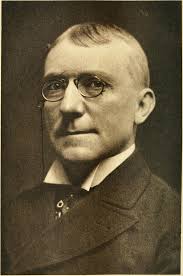Armazindy Page #4
James Whitcomb Riley poems book published in the 1894 book Armazindy and received very negative reviews that referred to poems like "The Little Dog-Woggy" and "Jargon-Jingle" as "drivel" and to Riley as a "worn out genius". Most of his growing number of critics suggested that he ignored the quality of the poems for the sake of making money.
I know the wish was wrong.— Yea, I am thankful that my sight Is shielded safe from such delight:— I can pray better, with this blur Of blindness—both for him and her. WE DEFER THINGS We say and we say and we say, We promise, engage and declare, Till a year from to-morrow is yesterday, And yesterday is—Where? THE MUSKINGUM VALLEY The Muskingum Valley!—How longin’ the gaze A feller throws back on its long summer days, When the smiles of its blossoms and my smiles wuz one- And-the-same, from the rise to the set o’ the sun: Wher’ the hills sloped as soft as the dawn down to noon, And the river run by like an old fiddle-tune, And the hours glided past as the bubbles ’ud glide, All so loaferin’-like, ’long the path o’ the tide. In the Muskingum Valley—it ’peared-like the skies Looked lovin’ on me as my own mother’s eyes, While the laughin’-sad song of the stream seemed to be Like a lullaby angels was wastin’ on me— Tel, swimmin’ the air, like the gossamer’s thread, ’Twixt the blue underneath and the blue overhead, My thoughts went astray in that so-to-speak realm Wher’ Sleep bared her breast as a piller fer them. In the Muskingum Valley, though far, far away, I know that the winter is bleak there to-day— No bloom ner perfume on the brambles er trees— Wher’ the buds ust to bloom, now the icicles freeze.— That the grass is all hid ’long the side of the road Wher’ the deep snow has drifted and shifted and blowed— And I feel in my life the same changes is there,— The frost in my heart, and the snow in my hair. But, Muskingum Valley! my memory sees Not the white on the ground, but the green in the trees— Not the froze’-over gorge, but the current, as clear And warm as the drop that has jes trickled here; Not the choked-up ravine, and the hills topped with snow, But the grass and the blossoms I knowed long ago When my little bare feet wundered down wher’ the stream In the Muskingum Valley flowed on like a dream. FOR THIS CHRISTMAS Ye old-time stave that pealeth out To Christmas revellers all, At tavern-tap and wassail-bout, And in ye banquet-hall.— Whiles ye old burden rings again, Add yet ye verse, as due: “God bless you, merry gentlemen”— And gentlewomen, too! A POOR MAN’S WEALTH A poor man? Yes, I must confess— No wealth of gold do I possess; No pastures fine, with grazing kine, Nor fields of waving grain are mine; No foot of fat or fallow land Where rightfully my feet may stand The while I claim it as my own— By deed and title, mine alone. Ah, poor indeed! perhaps you say— But spare me your compassion, pray!— When I ride not—with you—I walk In Nature’s company, and talk With one who will not slight or slur The child forever dear to her— And one who answers back, be sure, With smile for smile, though I am poor. And while communing thus, I count An inner wealth of large amount,— The wealth of honest purpose blent With Penury’s environment,— The wealth of owing naught to-day But debts that I would gladly pay, With wealth of thanks still unexpressed With cumulative interest.— A wealth of patience and content— For all my ways improvident; A faith still fondly exercised— For all my plans unrealized; A wealth of promises that still, Howe’er I fail, I hope to fill; A wealth of charity for those Who pity me my ragged clothes. A poor man? Yes, I must confess— No wealth of gold do I possess; No pastures fine, with grazing kine, Nor fields of waving grain are mine; But ah, my friend! I’ve wealth, no end! For millionaires might condescend To bend the knee and envy me This opulence of poverty. THE LITTLE RED RIBBON The little red ribbon, the ring and the rose! The summer-time comes, and the summer-time goes— And never a blossom in all of the land As white as the gleam of her beckoning hand! The long winter months, and the glare of the snows; The little red ribbon, the ring and the rose! And never a glimmer of sun in the skies As bright as the light of her glorious eyes! Dreams only are true; but they fade and are gone— For her face is not here when I waken at dawn; The little red ribbon, the ring and the rose Mine only; hers only the dream and repose. I am weary of waiting, and weary of tears, And my heart wearies, too, all these desolate years, Moaning over the one only song that it knows,— The little red ribbon, the ring and the rose! “HOW DID YOU REST, LAST NIGHT?” “How did you rest, last night?”— I’ve heard my gran’pap say Them words a thousand times—that’s right— Jes them words thataway! As punctchul-like as morning dast To ever heave in sight Gran’pap ’ud allus haf to ast— “How did you rest, last night?” Us young-uns used to grin, At breakfast, on the sly, And mock the wobble of his chin And eyebrows helt so high And kind: “How did you rest, last night?” We’d mumble and let on Our voices trimbled, and our sight Wuz dim, and hearin’ gone. ... Bad as I ust to be, All I’m a-wantin’ is As puore and ca’m a sleep fer me And sweet a sleep as his! And so I pray, on Jedgment Day To wake, and with its light See his face dawn, and hear him say— “How did you rest, last night?” A GOOD-BYE “Good-bye, my friend!” He takes her hand— The pressures blend: They understand But vaguely why, with drooping eye, Each moans—“Good-bye!—Good-bye!” “Dear friend, good-bye!” O she could smile If she might cry A little while!— She says, “I ought to smile—but I— Forgive me—There!—Good-bye!” “‘Good-bye?’ Ah, no: I hate,” says he, “These ‘good-byes’ so!” “And I,” says she, “Detest them so—why, I should die Were this a real ‘good-bye!’” WHEN MAIMIE MARRIED When Maimie married Charley Brown, Joy took possession of the town; The young folks swarmed in happy throngs— They rang the bells—they carolled songs— They carpeted the steps that led Into the church where they were wed; And up and down the altar-stair They scattered roses everywhere; When, in her orange-blossom crown, Queen Maimie married Charley Brown. So beautiful she was, it seemed Men, looking on her, dreamed they dreamed; And he, the holy man who took Her hand in his, so thrilled and shook. The gargoyles round the ceiling’s rim Looked down and leered and grinned at him, Until he half forgot his part Of sanctity, and felt his heart Beat worldward through his sacred gown— When Maimie married Charley Brown. The bridesmaids kissed her, left and right— Fond mothers hugged her with delight— Young men of twenty-seven were seen To blush like lads of seventeen, The while they held her hand to quote Such sentiments as poets wrote.— Yea, all the heads that Homage bends
Translation
Translate and read this book in other languages:
Select another language:
- - Select -
- 简体中文 (Chinese - Simplified)
- 繁體中文 (Chinese - Traditional)
- Español (Spanish)
- Esperanto (Esperanto)
- 日本語 (Japanese)
- Português (Portuguese)
- Deutsch (German)
- العربية (Arabic)
- Français (French)
- Русский (Russian)
- ಕನ್ನಡ (Kannada)
- 한국어 (Korean)
- עברית (Hebrew)
- Gaeilge (Irish)
- Українська (Ukrainian)
- اردو (Urdu)
- Magyar (Hungarian)
- मानक हिन्दी (Hindi)
- Indonesia (Indonesian)
- Italiano (Italian)
- தமிழ் (Tamil)
- Türkçe (Turkish)
- తెలుగు (Telugu)
- ภาษาไทย (Thai)
- Tiếng Việt (Vietnamese)
- Čeština (Czech)
- Polski (Polish)
- Bahasa Indonesia (Indonesian)
- Românește (Romanian)
- Nederlands (Dutch)
- Ελληνικά (Greek)
- Latinum (Latin)
- Svenska (Swedish)
- Dansk (Danish)
- Suomi (Finnish)
- فارسی (Persian)
- ייִדיש (Yiddish)
- հայերեն (Armenian)
- Norsk (Norwegian)
- English (English)
Citation
Use the citation below to add this book to your bibliography:
Style:MLAChicagoAPA
"Armazindy Books." Literature.com. STANDS4 LLC, 2025. Web. 8 Mar. 2025. <https://www.literature.com/book/armazindy_946>.








Discuss this Armazindy book with the community:
Report Comment
We're doing our best to make sure our content is useful, accurate and safe.
If by any chance you spot an inappropriate comment while navigating through our website please use this form to let us know, and we'll take care of it shortly.
Attachment
You need to be logged in to favorite.
Log In